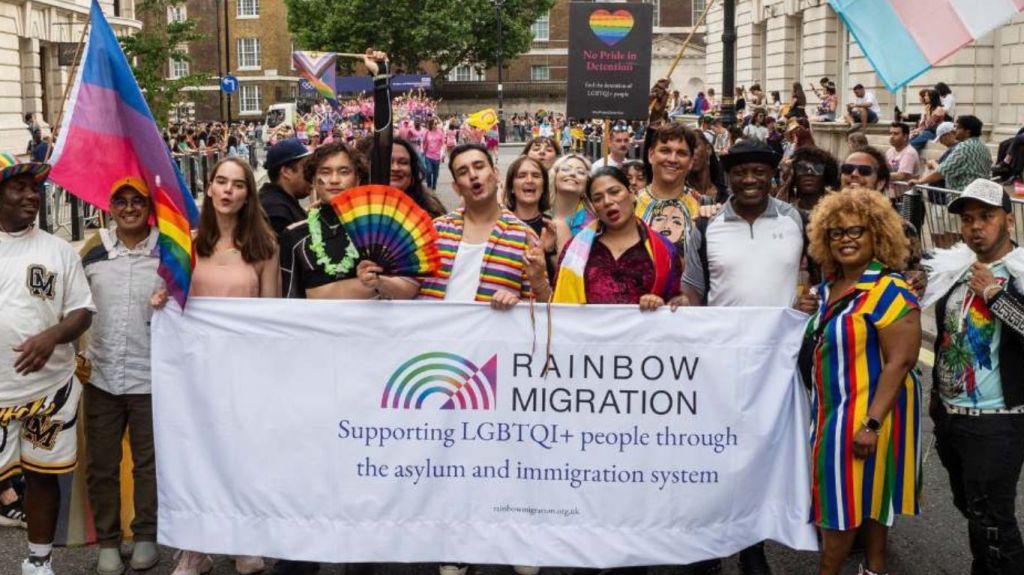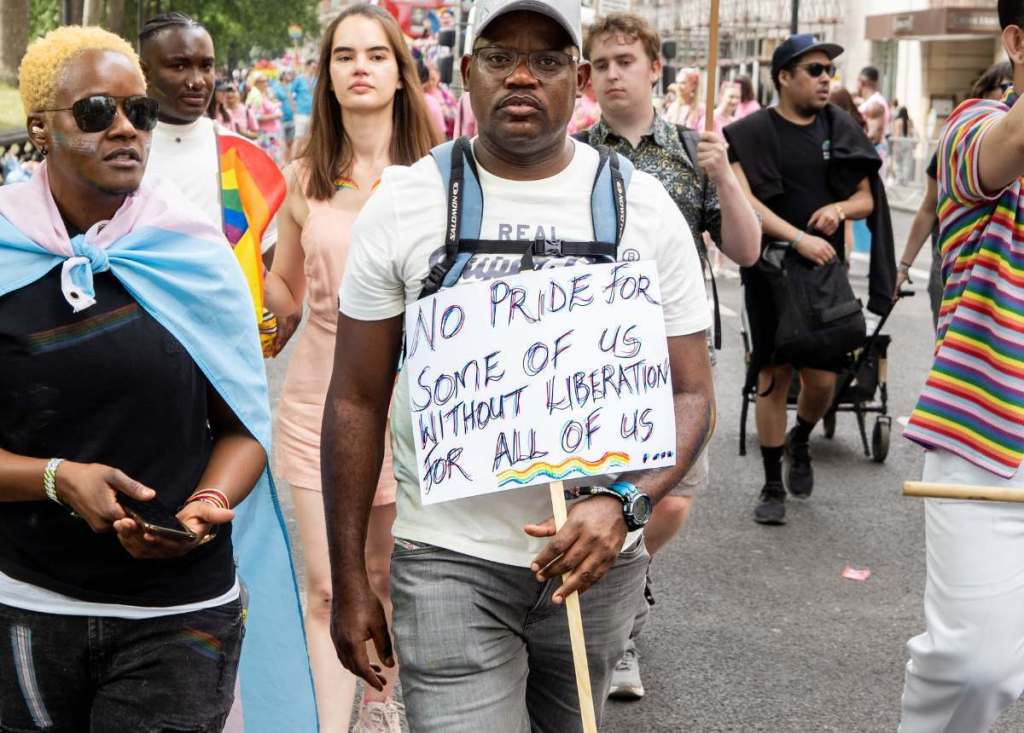‘Now is the time to strengthen LGBTQ+ asylum rights, not weaken them’

Rainbow Migration supporters at a protest. (Rainbow Migration)
As we come together to celebrate LGBTQ+ History Month, we must remind the government to choose compassion over cruelty when it comes to LGBTQI+ people seeking safety in the UK, writes Leila Zadeh, executive director of LGBTQ+ asylum charity Rainbow Migration.
Over the past three decades, we have celebrated key moments that have helped establish protections for LGBTQI+ people moving to the UK and seeking safety from persecution. However, those protections have also been – and continue to be – under threat.
At the beginning of the 1990s, a group of lesbian, gay and bisexual couples, along with their lawyers, fought to make it possible for the partners of the British citizens to remain in the UK. This led to the formation of Rainbow Migration, originally known as the Stonewall Immigration Group.
Thanks to relentless campaigning, same-sex couples were finally recognised positively for the first time in British law with the introduction of the Unmarried Partners Concession in 1997, paving the way for the Civil Partnership Act (2004) and Marriage Act (2013).

Yet, nearly five decades after the 1951 Refugee Convention came into force, LGBTQI+ people were still not recognised as eligible for refugee protection. Restrictive interpretations of the convention denied them safety until 1999. That year, and thanks to pressure from advocacy groups, the UK courts formally recognised LGBTQI+ people as a social group eligible for asylum.
Warren, a gay man from Malaysia, was the first LGBTQI+ person to be granted refugee status in the UK in 2000. After fleeing years of homophobic abuse at home, he was able to rebuild his life and find safety here. More than twenty years later, he still remembers the joy of the moment clearly: “I was so happy because, for the first time I felt like I was human again – whole again.”
A few years later, in 2010, a groundbreaking ruling was issued in the case of HJ (Iran) and HT (Cameroon). This landmark UK Supreme Court judgment affirmed that no LGBTQI+ person seeking asylum could be expected to conceal their sexual orientation to avoid persecution in their home country.
Before this historic judgement, many LGBTQI+ people seeking safety in the UK were refused refugee status under the premise that they could return home and hide their sexual orientation or gender identity in order to avoid persecution.

While these hard-won protections have transformed LGBTQI+ asylum and immigration rights, challenges remain – particularly the difficult task of proving one’s sexual orientation or gender identity to officials during the asylum process.
We can all imagine how hard it must be to prove your sexual orientation, or gender identity/expression to a stranger. For many LGBTQI+ people escaping violence and harm, the only evidence they have is their own testimony. As Adams, a bisexual man from Ghana said: “All I had was myself and my sexuality, but they said that wasn’t enough. It’s so difficult to get evidence of your sexuality.”
In recent years, regressive laws have only made this and other challenges for LGBTQI+ people seeking safety worse.
The Nationality and Borders Act, passed in 2022, introduced a higher standard of proof for all refugees, meaning LGBTQI+ people now have to provide even more evidence to prove their sexual orientation or gender identity, putting them at greater risk of being returned to the horrific situations they fled.
And with the Illegal Migration Act (2023), the government can deny people the right to claim refugee protection based solely on how they arrived in the UK, detaining people for as long as the government considers ‘reasonable’ before sending them back.
‘Detention is terrible for anyone’
Detention is terrible for anyone, but for LGBTQI+ people, it can be hell on earth. Many suffer homophobic bullying, harassment and abuse from staff or others inside.
This law also denied refugee protection to people from a list of so-called ‘safe’ countries – many of which are, in fact, dangerous places for LGBTQI+ people, such as India, Albania, or Georgia.
Noah, a gay man from Georgia, who was granted refugee status in the UK a year ago, told us: “No one can know you are gay in Georgia. If people do, homophobic people will try to attack you.”
‘It’s time for a real change’
Last week, the government announced its new Border Security, Immigration and Asylum Bill. With the exception of a few measures like scrapping the Safety of Rwanda Act, it does not appear to represent a meaningful break from the cruelty of past governments.
But it’s not too late to change this. With the bill about to begin its passage through Parliament, the government still has a choice: Will it make the UK a safe haven for LGBTQI+ people seeking safety here, or will it continue turning its back on the LGBTQI+ community?
It’s time for a real change: This government must commit to protecting LGBTQI+ people who seek sanctuary in the UK by repealing the Illegal Migration Act in full, as well as the Nationality and Borders Act, and ending the immigration detention of LGBTQI+ people.
Leila Zadeh is the executive director of Rainbow Migration – a UK-based charity that helps LGBTQ+ people seeking asylum.
How did this story make you feel?

